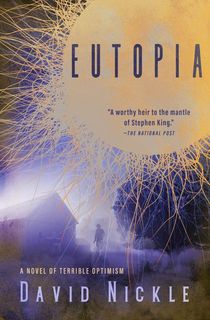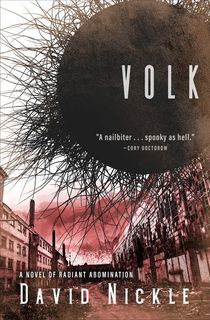Lovecraft Country is sure to make a certain kind of H.P. Lovecraft fan very happy. This is not to say the new HBO series from Misha Green will please all of Lovecraft’s acolytes. The story is a continuation of a conversation that has been going on in the Lovecraftian weird fiction community—often quite heatedly—for many years.
Lovecraft Country is an adaptation of Matt Ruff’s 2017 novel of the same name. It’s the story of Black Korean War veteran Atticus Turner and his circle of family and friends, all attempting to survive and occasionally thrive in the very white world of 1950s America. He is also a fan of pulpy science fiction and horror—and so knows his way around both the horrors that Lovecraft both dreamed up in his Cthulhu mythos, and the racism and xenophobia that poisoned Lovecraft’s work and letters.
Related: Everything We Know About the HBO Horror Series Lovecraft Country
In Lovecraft Country, the characters face both kinds of horrors: a society of powerful and corrupt sorcerers who bend reality to admit alien monstrosities, and the more mundane horror of Jim-Crow-era anti-Black racism as it manifested in everyday reality.
That racism is ever-present in Lovecraft’s very influential work and has been an embarrassment to many keepers of his legacy. For a long time, it was (in my personal experience of genre discourse at any rate) all but impossible to talk about.
And that is what is so satisfying in seeing Ruff’s book adapted for the screen. Lovecraft Country is one of a small legion of works that have emerged over the past few decades that interrogate Lovecraft’s prejudices at the same time they celebrate his aesthetic.
My own books, Eutopia: A Novel of Terrible Optimism and its sequel Volk: A Novel of Radiant Abomination, I wrote with this ambition top of mind.
When I started work on Eutopia in the early 2000s, I drew inspiration at once from Lovecraft’s alien and indifferent pantheon of god-like creatures, and the intersection of his more racist ideas with the American eugenics movement that grew contemporaneously with him.
Related: 13 Must-Read Horror Books by Diverse Authors
The racist and ableist pseudoscience of eugenics was something I saw as implicit in many of Lovecraft’s work—and as with the explicitly racist treatment of the Black citizens of mid-20th-century America that provide the real-world horror in Ruff’s novel, Lovecraft did not treat eugenics as an implicit horror, but rather the opposite.

Eutopia
This debut historical horror novel by David Nickle “establishes him as a worthy heir to the mantle of Stephen King” (National Post).
So it was that I subtitled Eutopia a tale of “terrible optimism.” The story is about the racist and ableist underpinnings of what was at the time considered a utopian idea: to build an objectively better human race by culling the members that the eugenicists believed to be inferior. That is to say, all but the white and able-bodied. There is a Lovecraftian monster at the heart of it—but the purity of the eugenicists offers no defense. Indeed, they are in league with it.
Related: What Are the Scariest Books You've Ever Read?
I am far from alone in taking this approach to writing about Lovecraft’s human monstrosities.
Particularly over the last decade, there have emerged a number of works taking a hard and critical look at the work of an author who is arguably one of the chief founders of modern horror fiction.

The Ballad of Black Tom by Victor LaValle is probably along with Lovecraft Country the best-known from this set. Black American writer LaValle’s novella is a reworking of one of H.P. Lovecraft’s most openly racist works, “The Horror at Red Hook.” Told in part from the point of view of Charles Thomas Tester, a Black musician and hustler eking out a living in Jazz Age Harlem, the story deliciously subverts the story’s implicit white supremacy, and so reclaims it.
Related: 14 Dark and Twisted Cult Horror Movies You Need to See
Lovecraft’s own novella “A Shadow Over Innsmouth” is less explicitly racist than “Red Hook”—but it is nevertheless a horror story of miscegenation, focusing on the degradation of cross-species inter-breeding between the people in the eponymous New England fishing village and Deep Ones, a malevolent race of humanoid fish creatures. In his short novel Cold Skin, Catalan author Albert Sanchez Pinol takes a postcolonial critique to the Lovecraftian original, telling the tale of two European men on a weather station/lighthouse near Antarctica, battling a similarly-described species of amphibious bipeds, and eventually capturing one of them and keeping her as a sex slave.
Nick Mamatas, who has hybridized Lovecraftian fiction with various forms—including a just re-released version of Move Underground, which brings the beat-generation icon Jack Kerouac into the Lovecraftian mythos—took on Lovecraftian fandom in his satirical murder mystery I Am Providence, set among Lovecraft fans and authors at a fictionalized convention in Lovecraft’s home-town of Providence, Rhode Island.

Volk
Nickle's sequel to Eutopia is “a nailbiter . . . that is spooky as hell, a critical and sharp demolition of Lovecraft’s own romanticization of eugenics” (Cory Doctorow, Boing Boing).
Canadian author Jacqueline Baker’s The Broken Hours offers a similarly pseudo-realist take on Lovecraft, but to say the slow-burn story of Lovecraft’s fictional personal secretary Arthor Crandall in the twilight of the author’s life is entirely without supernatural elements would be inaccurate. What it is, is a portrait of a writer terrified not only of the other, but finally of everything beyond his dark and musty rooms.
Related: 11+ Horror Movies You Need to See, According to Jordan Peele
Mexican-Canadian author and editor Silvia Moreno Garcia has long taken an interest in Lovecraft’s uglier and more problematic anxieties. As an editor, she and Paula L. Stiles pulled together the World-Fantasy-Award-winning anthology She Walks In Shadows (a.k.a. Cthulhu’s Daughters), of Lovecraftian fiction by female-identifying authors—showcasing work by Gemma Files (Experimental Film), Molly Tanzer (Creatures of Want and Ruin), Nadia Bulkin, E. Catherine Tobler, and others.
Her newest book, the New York Times best-selling Mexican Gothic, strikes a powerful chord.
The novel is set in the mansion of an English mining family in Mexico, stubbornly importing both their culture and noxious eugenicist theories, and some other things nearer to Lovecraft’s imagined cosmology. And as the title announces, the story is a full-born gothic horror show, full of thick fog and lit by flickering gaslight. Thematically, Mexican Gothic a not-at-all hidden stab at the colonial, white-supremacist patriarchy to which Lovecraft so often clung.
Related: An Interview with Stephen Graham Jones, Acclaimed Horror Author of The Only Good Indians
These works may not be for everyone—but they are the sorts of stories that make this particular Lovecraft acolyte very happy indeed to see on the page, and now too on the screen. There is, after all, lots to talk about when we talk about Lovecraft. And there is hope that work like Lovecraft Country in image and prose will help create a dialogue, will let us speak more openly about how Lovecraft’s troubling legacy reflects and manifests itself upon these times in which we live.
David Nickle is an award-winning Canadian author and journalist-author of five novels and numerous short stories, many of which are collected in two story collections, Monstrous Affections and Knife Fight and Other Struggles. His latest novel, Volk: A Novel of Radiant Abomination completes The Book of the Juke series begun with Eutopia: A Novel of Radiant Abomination. He lives and works in Toronto with his wife, science fiction novelist and futurist Madeline Ashby. You can find him online at his website and blog The Devil’s Exercise Yard, follow him on Twitter at @bydavidnickle (for fiction) or @davidnickle (for journalistic work), on Instagram at @david_nickle or on Facebook.
Featured still from "Lovecraft Country" via Warner Bros.
